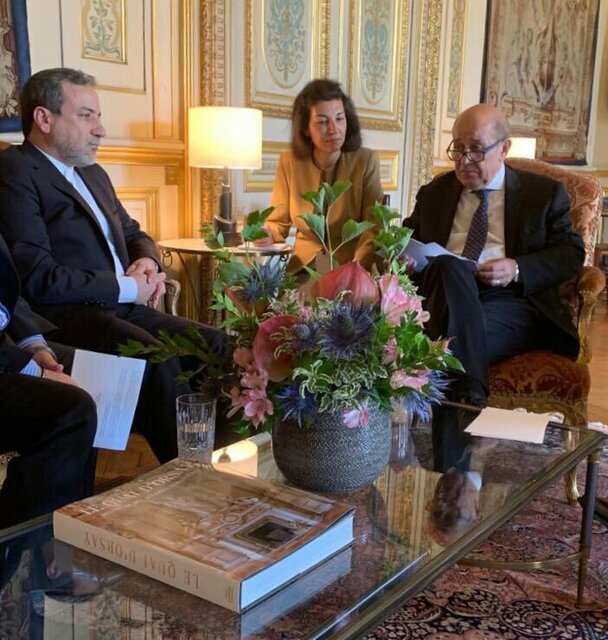Iran says won’t let disturbance in Strait of Hormuz

TEHRAN - Iranian Deputy Foreign Minister for Political Affairs Abbas Araghchi said on Tuesday that Iran will not let disturbance in shipping in the Strait of Hormuz.
“Iran will make any effort to maintain security in this region, especially in the Strait of Hormuz, and will not allow any disturbance in shipping in this sensitive region,” he said during a meeting with French Foreign Minister Jean-Yves Le Drian in Paris.
Araghchi was in Paris to relay a message by President Hassan Rouhani to French President Emmanuel Macron.
Araghchi said that the U.S. “illegal” and “unfair” sanctions have targeted the people of Iran and urged the Europeans to adopt a transparent stance against Washington’s policy in cutting Iran’s oil sale.
However, Araqchi said, “The Islamic Republic of Iran will continue exporting its oil under any circumstances.”
Commenting on the 2015 nuclear deal, known as the JCPOA, Araqchi said diplomatic paths are always open to save the deal from a total collapse.
He said Iran has reduced its nuclear commitments within the framework of the JCPOA.
Le Drian said that France will make any effort to preserve the JCPOA.
The French foreign minister described launching the Instrument in Support of Trade Exchanges (INSTEX) as an “important political step”.
INSTEX is a European special purpose vehicle aimed at facilitating legitimate trade between Europe and Iran.
The EU announced on June 28 that INSTEX has gone into effect.
Tehran says the mechanism is far short of Iran’s expectation. Iran insists the mechanism should include Iran’s oil purchases.
Majid Takht Ravanchi, Iran’s permanent representative to the United Nations, has likened INSTEX to a “beautiful car without gasoline”.
“The current situation of INSTEX does not suffice. This mechanism without money is like a beautiful car without gasoline,” he told reporters on June 29.
Secretary General of the European External Action Service (EEAS) Helga Schmid said on July 11 that countries outside the European Union will join INSTEX.
According to AP, she said that beyond the 10 EU nations that are already part of the system, she could “share with you that more, also non-EU member states, will join.”
Apart from the three EU member nations that are party to the deal - Britain, Germany and France - seven more EU member states have recently committed to take part.
On May 8, exactly one year after the U.S. withdrew from the multi-nation nuclear agreement, Iran announced a partial withdrawal from some aspects of the pact, saying that the country would no longer adhere to some of the limits on its nuclear activities. It also threatened to step up uranium enrichment if an agreement is not made within 60 days to protect it from the sanctions’ effects.
In follow-up to that deadline, on July 7 Iran announced that it has started enriching uranium to a higher purity than the 3.67% as the Europeans missed the 60-day deadline to devise a concrete mechanism to protect the country from the U.S. sanctions.
However, Iran has said if the remaining parties take concrete steps to shield the country from sanctions it will reverse its decisions.
Russian Foreign Minister Sergey Lavrov and Le Drian held a phone conversation on Tuesday discussing the JCPOA.
“Mr. Lavrov and Mr. Le Drian agreed to continue taking concrete steps towards preserving the JCPOA and reducing tensions around Iran,” reads a statement issued by the Russian Foreign Ministry.
In addition to ditching the nuclear deal, the United States has deployed warships, fighter jets, Patriot anti-missile batteries, troops in the region for a possible confrontation with Iran.
On June 20, Iran downed an intruding U.S. surveillance drone as it breached the Iranian airspace over the southern shores of Hormozgan province.
Macron announced on July 15 that he would speak to Rouhani, Russian President Vladimir Putin and U.S. President Donald Trump as part of a French initiative to prevent an escalation of tensions in the Middle East.
“The momentum we built over the last few weeks has, I think, prevented the worst from happening and overreactions on the Iranian side,” Macron told a joint press conference with his Serbian counterpart.
“In these difficult conditions, we will continue our mediation and negotiation work,” he added.
NA/PA
Leave a Comment